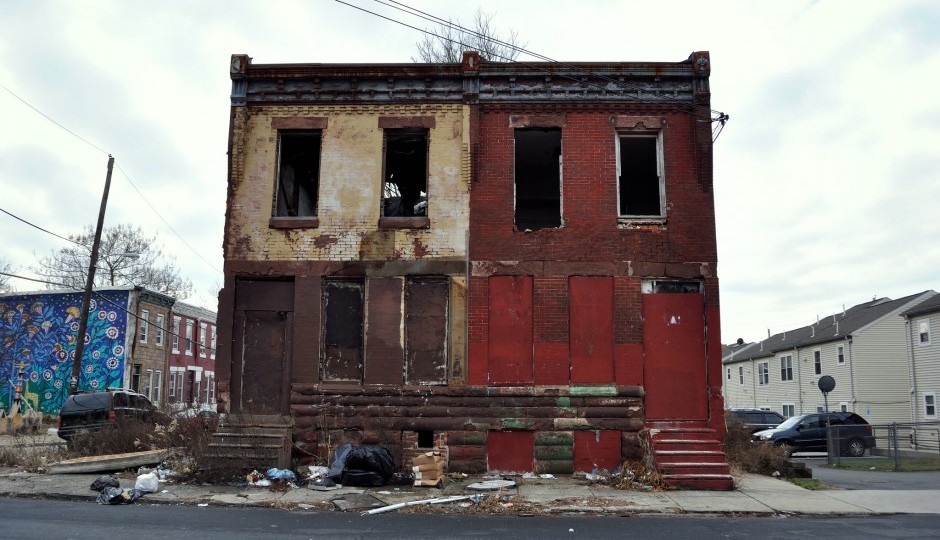Philly’s Tax Lien Sale Sucked*
Philadelphia’s first tax lien sale under Mayor Michael Nutter was a flop. But it was also kind of amazing.
I’ll explain, but first, a quick primer on this complex but important problem. Tax liens are legal claims the city slaps on properties when the owners of those properties fail to pay their taxes. Liens give the city the right to auction off tax-delinquent properties and use the profits to cover the taxes that are owed. Property tax delinquency is an epidemic in Philadelphia. About 100,000 properties are in arrears — which is one of the highest rates in the nation — and they owe a total of about $500 million in unpaid taxes and penalties to the city and cash-strapped School District of Philadelphia. As large as that $500 million figure is, the bigger problem with property tax delinquency is probably the blight generated by past-due parcels, which are often vacant and owned by speculators, not homeowners.
The city has struggled mightily to curb rampant tax delinquency. The lien sale was an experimental attempt at a new strategy: selling the liens to private investors, who would then have the same authority the city has to collect penalties and interest from delinquent property owners, and even to begin foreclosure proceedings on delinquent properties. Lien sales are, at root, an outsourcing of delinquency enforcement.
Over the last few days, the city tried to auction off 865 liens online. The sale ended Monday, and the results sucked. Philly sold only sold 28 percent of the liens for a total of $2.1 million, according to data from the city’s revenue department.
But something the city government did right before the lien sale was a lot more successful. It mailed letters to deadbeat owners of more than 4,000 properties, warning them of the impending lien sale. The threat was clear: If they didn’t pay their delinquent taxes, the city would try to sell their debts to a third party.
Out of the 4,000-plus properties, 1,419 of the owners paid their delinquent taxes in full, while 645 paid their 2015 taxes. The city reaped $5.5 million in cash, as well as an additional $2.2 million in expected payment agreements, said mayoral spokesman Mark McDonald. All together, that’s about $10 million in proceeds.
In other words, it appears that a lien sale is an incredibly effective tool with which to threaten property owners who haven’t paid their taxes.
“This has been the fastest and most impactful enforcement tool that anyone in revenue can recall,” said Clarena Tolson, commissioner of the revenue department. “From start of process to finish was just over seven weeks.”
Comparatively, Tolson said, the process of offloading a property at a sheriff’s sale can take nine months to a year.
Why was the lien sale itself so unsuccessful? A few potential reasons. One is that the liens might have been priced too high. The city required a minimum bid worth the total value of the delinquent tax bill (including interest and fees) minus the penalty. In English, that means an investor would have to bid at least $2,850 to purchase the rights to collect a tax bill worth $2,975.
Ori Feibush, a real estate agent and former City Council candidate, said he didn’t know why anyone would make that investment. He said he crunched the numbers on a few liens, and determined that he would be able to collect a 2 percent to 3 percent return on his money if he bought them.
“There’s no value to the buyer to do that,” he said. He admitted, though, that, “There may be some reason that I’m just not aware of” that it would be beneficial.
Another possible reason that the lien sale sucked is that investors researched the liens up for sale, and decided the taxes simply weren’t collectible. Perhaps the property owners hadn’t paid their taxes for a decade, or the owners looked to be dead or MIA.
That’d be an argument for the city wiping its books clean of some property tax debts, which is what Beth McConnell, policy director of the Philadelphia Association of Community Development Corporations, thinks it should do.
“The city has a lot of tax-delinquent debt on its books that it should probably clear because the owners are nowhere to be found,” she said.
Officials say that this first sale was just a pilot program intended to test the waters for a bigger sale in the future. Should the city move forward with another auction, in part so that it can simply collect back taxes by warning delinquent property owners that a lien sale is on the way? Or will threatening letters from the city be less scary now that people know the lien sale was a flop? Another thing that must be considered is whether the benefits of a lien sale are worth putting up with its potential costs, such as undermining the city’s new land bank and harming neighborhoods.
